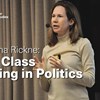glue
The essence of norms in Sicily – home of the Mafia
Social norms are the glue that holds society and people together. But how can we change poor, destructive norms? Giulia Andrighetto is using theory and experiments in her search for new knowledge. Amo

The socially sustainable society
A socially sustainable society is a society where people live well and feel safe. But such a society is constantly faced with challenges, from organized crime, differences in values and scarcity of resources, but also from ideas we have about each other that are not even conscious but can still affect the way we shape our society. This is our most comprehensive theme.
Homophily and Insularity Dynamics in an Echo Chambers: Computational Models for the Study of the Conspiracy Subculture in Facebook
Social Indicators Research Abstract The research focuses on developing a computational model (agent-based) to describe and analyse the structure and evolution of a conspiracy bubble within Facebook. Thedescriptiveexperimental
Postdoc to do research on social norm change
Norms can be a driver for change, so in order to understand how our societies will develop over time it is important to understand how norms form and change. We are now searching for a postdoc with extra interest in studying this with us at the Institute for Futures Studies!
Post doc for project on how social norms emerge and change
We are seeking a strong and highly motivated candidate with a background in experimental sociology, economics, or social psychology for a postdoctoral position. The advertised position is a two-year po, the Principal Investigator of the five years Wallenberg Foundation Project
Research seminar with Johanna Rickne: The Class Ceiling in Politics
Venue: Institutet för framtidsstudier, Holländargatan 13, 4th floor, Stockholm, or online.Research seminar with Johanna Rickne, professor of Economics at SOFI, Stockholm University.Register hereAbstracPrior studies have documented that working-class individuals rarely become parliamentarians. We know less about when in the career pipeline to parliament workers disappear, and why. We study these questions using detailed data on the universe of Swedish politicians’ careers over a 50-year period. We find roughly equal-sized declines in the proportion of workers on various rungs of the political career ladder ranging from local to national office. We reject the potential explanations that workers lack political ambition, public service motivation, honesty, or voter support. And while workers’ average high school grades and cognitive test scores are lower, this cannot explain their large promotion disadvantage, a situation that we label a class ceiling. Organizational ties to blue-collar unions help workers advance, but only to lower-level positions in left-leaning parties. We conclude that efforts to improve workers’ numerical representation should apply throughout the career ladder and focus on intra-party processes.

Johanna Rickne: The Class Ceiling in Politics
Research seminar with Johanna Rickne, professor of Economics at SOFI, Stockholm University Abstract: Prior studies have documented that working-class individuals rarely become parliamentarians. We kno








